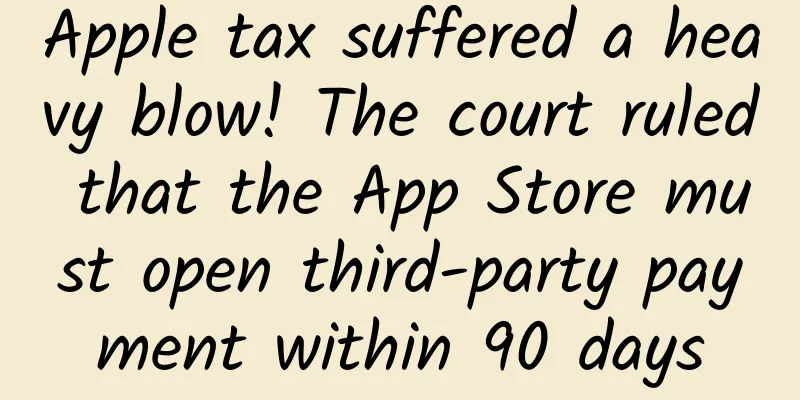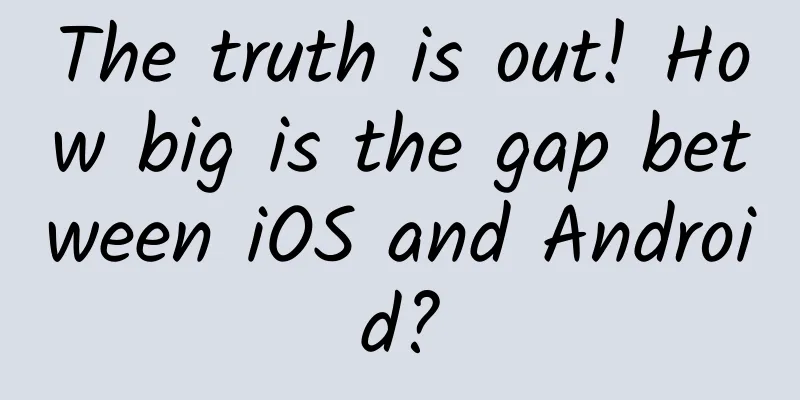Apple tax suffered a heavy blow! The court ruled that the App Store must open third-party payment within 90 days

|
This article is reprinted with permission from AI new media Quantum Bit (public account ID: QbitAI). Please contact the source for reprinting. The "Apple tax", Apple's money-making tool , is in real trouble this time.
Just now, a California court issued an injunction, and Apple’s stock price closed down 3.31%, with its market value evaporating by about US$85 billion (about RMB 547.7 billion), marking the biggest drop since May. What happened? It turns out that the ban requires Apple not to restrict APP developers from directing users to third-party payment systems . The ban is expected to take effect on December 9 this year. Many netizens believe that if the higher court does not overturn the ban, it will mean that the "Apple tax" has been put to bed. This is actually the latest development in the "war" between Apple and "Fortnite" developer Epic Games . However, in addition to the ban on the "Apple tax", the judge rejected Epic's request for Apple to open up channels for app downloads outside of the App Store. The court also did not believe that Apple constituted a monopoly in the mobile game trading market , but "under the California Competition Act, Apple is indeed engaging in anti-competitive behavior." In addition, in another ruling, the court determined that Epic's previous practice of bypassing Apple Pay and providing a direct payment option in "Fortnite" did breach the contract. Therefore, Epic needs to pay Apple 30% of all revenue since the launch of the system, totaling more than US$3.5 million (approximately RMB 22.55 million). In other words, Apple has actually won the lawsuit. But Spotify, which has also criticized the "Apple tax," said it was pleased with Epic's achievements in the lawsuit:
Foreign media The Verge also believes that this ruling may have a significant impact on other large companies besides Apple. For example, Google is also facing lawsuits similar to Epic vs. Apple. Apple and Epic Games antitrust lawsuitThe dispute between Apple and Epic Games began in August last year . In August 2020, in order to avoid the 30% "Apple tax", the game app "Fortnite" under the game company Epic Games bypassed Apple's in-app purchase payment system and provided users with a cheaper direct payment channel to purchase in-game items. Apple certainly couldn't tolerate this and quickly removed the game from the APP Store on the grounds that it violated its payment rules. A few days later, all Epic developer accounts were deactivated , cutting off their access to iOS/Mac development tools. As we all know, due to its own system and ecology, Apple products can only download applications from the APP Store. As a result, Epic has directly lost all Apple users and players . △ TPS game "Fortnite" with 300 million players Epic Games actually had grievances for a long time . This incident directly led it to first "modify" Apple's classic advertisement "1984" to satirize Apple's monopoly behavior, and then launched the topic #FreeFortnite on social media. Of course, there is a more powerful declaration of war: filing an antitrust lawsuit in court. In fact, it's not just Epic. Many people are dissatisfied with Apple's practice of taking a 30% commission on all paid apps in the App Store. But what is most unbearable for developers is that when they make purchases in such apps, Apple will charge them another 30% tax . The most direct impact on us consumers is that, for example, some time ago WeChat planned to provide cloud storage services for chat records, which may cost 180 yuan per year for Apple users, while Android users only need 130 yuan . This has also forced many domestic apps to come up with this method: Apple client recharges need to be bound to WeChat, and tokens or redemption codes must be purchased on official accounts or mini-programs. Even Tencent once had a lawsuit with Apple over the WeChat reward function on the iOS system because of the commission issue, but the final result was still reasonable. Apple compromised and no longer took commissions from rewards on WeChat public accounts (because this is a personal behavior between readers and authors). But Apple Stores do not violate antitrust lawsIt is worth noting that the final judgment to open the in-app purchase payment channel within 90 days will affect Apple’s App Store ’s tens of billions of dollars a year in lucrative business (Apple earned approximately US$19.29 billion in revenue in 2020 through the App Store alone). However, the court still ruled that the App Store did not violate antitrust laws , so Epic's previous practice of linking to its own payment channel was still a breach of contract. So the consequence is that the plaintiff Epic will also have to pay compensation . "Fortnite," which had 300 million players at the time, earned about $12.17 million through its own payment channels. After all the calculations, Epic still needs to pay Apple at least $3.65 million (plus other compensation). And Epic will still not be able to go online on the Apple Store for a while. On September 10, Epic Games asked Apple to restore its "Fortnite" developer account in order to re-release the iOS version of the game in South Korea, providing two payment channels, Apple and Epic. Previously, South Korea proposed a bill that would ban Apple and Google from charging software developers commissions for in-app purchases. However, Apple has currently rejected Epic's request. Although this legislation in South Korea has not yet come into effect, according to Apple, Epic has already violated the law, and even if the legislation comes into effect, it will not have any impact on whether they approve Epic's account or not - unless Epic agrees to "play" according to the same rules as everyone else. Oh yes, in fact, on August 26, Apple released an update to the APP Store payment rules on its official website. One of the rules showed that developers can provide users with third-party payment method information for in-app purchases via email. This is also based on the litigation settlement agreement reached with app developers such as Cameron. Won, but not completelyRegardless, Apple has viewed the ruling as a victory for its App Store model. An Apple representative said:
Epic CEO Tim Sweeney also publicly expressed his dissatisfaction, believing that "this ruling is not a victory for either developers or consumers." Currently, Epic has decided to continue to appeal . However, many media and industry insiders still believe that a series of trends represented by this ruling indicate that the APP platforms' policy of taking commissions from others is being shaken. Well-known iOS app developer Steve Troughton-Smith believes:
Previously, Japanese regulators had urged Apple to relax restrictions on the App Store and allow applications such as music, magazines, and videos to direct users to external websites to pay. This time, Apple won, but it seems not to have won completely. What do you think? |
>>: iOS 15 is coming soon: a bunch of new features
Recommend
How to monetize short videos? Here are 7 ways
In recent years, short videos have been very popu...
An agenda sheet reveals the secrets of Google I/O
[[133647]] Recently, Google officially released t...
It turns out you are such a "little axe"!
◎ Science and Technology Daily reporter Yang Xue ...
Tencent fully discloses its VR plan for the first time, and its ambition is no less than the next WeChat
In the relatively "chaotic" and stalema...
Tips for attractive job ads!
As we all know, a job advertisement consists of t...
Collection | 30+ data analysis and production tools essential for operations!
Today, I would like to recommend some commonly us...
CCTV vs. Apple: How to define online privacy?
CCTV is fighting Apple again, but unlike the last ...
How do the popular blue Vs on Douyin operate content?
Today, Tik Tok has become a battlefield that cann...
The goldfish has been wronged for so long, will it really eat to death?
Goldfish don’t die from being “overfed”, they die...
What? The "yogurt" you drink may not be real yogurt...
A while ago, a popular yogurt brand was discussed...
Super comprehensive! Comparison of design differences between Android apps and iOS apps
Editor's note: For the same app, why are the ...
The second week after "positive" is very important! If these 4 symptoms appear, it may turn into a serious condition!
Fever, cough after infection... The first week of...
Why do you get angry when you're hungry? You may have "hunger rage"!
When you're hungry, do you feel irritable and...
LinkedIn Global Vice President: The growth process from 0 to 500 million users
I joined LinkedIn in 2011, and since then I have ...
Tiye Duck Duck 2nd iPad Illustration Class
Course Catalog ├──Courseware+color card+brush | ├...






![Tianfu Chengdu Tea Tasting has its own star-rated studio [recommended collection]](/upload/images/67cc1693167f9.webp)


